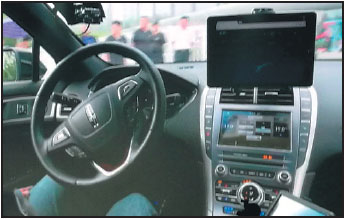Baidu chief takes spin in a self-driving car
By Fan Feifei (China Daily) Updated: 2017-07-06 07:18|
Inside Baidu's high-tech prototype.Provided To China Daily |
Chinese internet search giant Baidu Inc tested a self-driving vehicle in Beijing on Wednesday, with its chairman and CEO Robin Li sitting in the passenger seat.
Another Baidu employee was in the driver's seat, but wasn't touching the wheel.
The test, conducted on the capital's Fifth Ring Road, aroused the interest of more than the audience of Baidu developers to whom it was livestreamed. City traffic authorities looked askance at the test and are now investigating whether the test was legally conducted.
Under current traffic law, no vehicle is allowed on the city's roads without a qualified driver operating it in a proper manner.
The company said the person behind the steering wheel was "driving" - monitoring the vehicle without touching it. It declined to answer when asked if it had obtained permission to conduct the test.
Although there are currently no laws or regulations addressing self-driving vehicles in China, the topic has gone viral with intensified research efforts as technology matures in this area.
The destination for Li's self-driving car was a Baidu developers' conference on artificial intelligence research and development.
"We will usher in an artificial intelligence era," Li told the audience, calling the market prospects for self-driving vehicles a vital part of overall artificial intelligence. Baidu is willing to share these cutting-edge technologies with industry partners, he added.
"Baidu has invested heavily in the AI sector, as 15 percent of our revenue has been spent on the R&D of AI technologies in the past few years," Li said.
In April, Baidu announced a new project called Apollo, which is designed to open up its autonomous driving platform to partners - a move to promote the development of self-driving technology.
Lu Qi, Baidu's group president and chief operating officer said at the conference that more than 50 partners have joined the Apollo open autonomous driving project, forming one of the largest and most diverse autonomous driving ecosystems. Lu called the project an important milestone for the automotive industry.
Zeng Zhiling, managing director of LMC Automotive Consulting Co, said Baidu's efforts toward an open self-driving platform and related technologies are of great significance to the automotive industry and will boost the development and adoption of autonomous driving.
However, auto companies still have a long way to go before self-driving technologies will be available in large-scale commercial applications, experts said.
"Self-driving has become a trend in the automotive industry, but more time is needed before such vehicles can realize mass production and commercial application," said Xu Yanhua, deputy secretary-general of the China Association of Automobile Manufacturers, noting that US tech heavyweight Google Inc is still in the testing stage of its own self-driving vehicles.
More tolerance and support should be given to innovative driving technologies and business models, said Zhu Wei, a professor of communications law at China University of Political Science and Law, but said he worries about safety.
"There is no doubt that the safety issue always comes up as the top priority," Zhu said.
fanfeifei@chinadaily.com.cn
- 'Cooperation is complementary'
- Worldwide manhunt nets 50th fugitive
- China-Japan meet seeks cooperation
- Agency ensuring natural gas supply
- Global manhunt sees China catch its 50th fugitive
- Call for 'Red Boat Spirit' a noble goal, official says
- China 'open to world' of foreign talent
- Free trade studies agreed on as Li meets with Canadian PM Trudeau
- Emojis on austerity rules from top anti-graft authority go viral
- Xi: All aboard internet express












